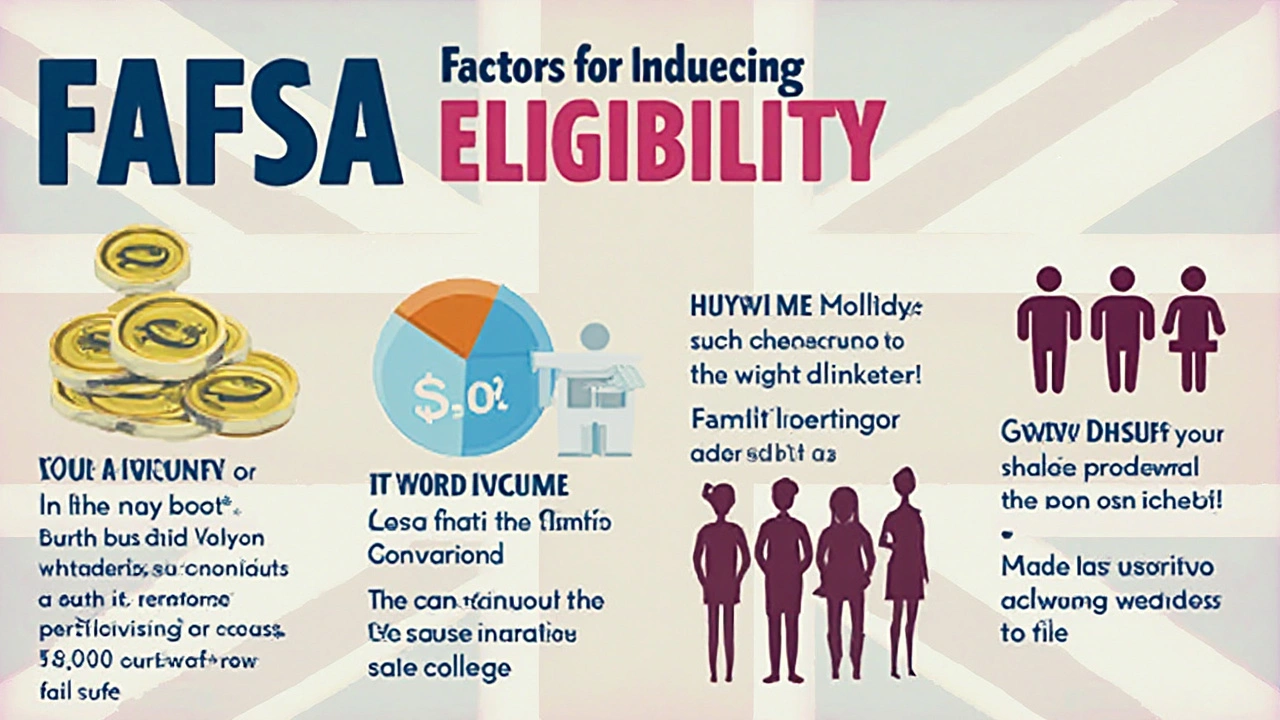If you and your partner pull in $120,000 a year, you might be scratching your head wondering if your kid can score some of that sweet FAFSA cash for college. Here’s the thing, you're not bending over backward to fill out forms just to get shut down. Your family’s bank account isn’t the only thing they look at, believe it or not. So, let's break this down a bit.
First up, FAFSA isn't just giving a ‘yes’ or ‘no’ based on income alone. They’re into the whole picture: family size, who else is hitting the books, maybe even what you pay on monthly. Yeah, it can feel like you’re on trial with all those questions, but it’s worth it to dig in.
And just because you hit a six-figure income doesn’t mean the door slams shut on help. Schools have different ways of figuring out who needs what, and sometimes, magic happens. Crafty use of the FAFSA can open doors you didn't know were there, like grants or work-study gig pointers.
- Understanding FAFSA Basics
- Income Thresholds and Considerations
- Impact of Family Size and Assets
- Maximizing Your Financial Aid Opportunities
Understanding FAFSA Basics
So, what’s the deal with FAFSA? It’s not as scary as it sounds. The Free Application for Federal Student Aid, which you probably know as FAFSA, is Uncle Sam’s way of figuring out how much financial aid your college-bound kiddo qualifies for. Filling it out opens the door to federal grants, work-study jobs, and loans, whether you're making $30k or $120k.
FAFSA uses something called the Expected Family Contribution (EFC) to guess what your family can afford for college. Don’t worry, it’s just a number. It doesn’t even mean what it sounds like! The EFC considers stuff like your income, how many kids you’ve got in college at the same time, and even your family’s assets. So, if you have a couple of college-bound students, that can tilt the scales in your favor.
Why is FAFSA eligibility crucial? Because colleges look at that EFC to decide what aid they can give you. And, fun fact: many states and colleges use your FAFSA info to dish out their own aid packages. So, it’s not just a federal thing!
Never filled out FAFSA before? No sweat. Here’s a simple rundown:
- Get Your Documents Ready: You’ll need tax info, Social Security numbers, and some other bits and bobs.
- Apply Online: Head over to the FAFSA website or use their mobile app. Easy-peasy.
- Meet the Deadline: FAFSA opens every year on October 1st—mark it in your calendar.
Remember, applying for financial aid isn’t just for lower-income families. Even at $120k, doors can open. Colleges are more generous than you might think, so never skip the FAFSA just because you’ve got a good salary.
Income Thresholds and Considerations
So, you’re making $120,000 a year and thinking that FAFSA might not be your thing. The good news? It’s not all about your paycheck. FAFSA eligibility revolves around the Expected Family Contribution (EFC), which considers more than just income. It's a kind of mysterious blend of variables to decide what you should contribute towards college costs.
Now, thinking about these thresholds can be a bit of a puzzle. FAFSA checks out your adjusted gross income (AGI), which you find on your tax return. But they've got other stuff on their radar too, like your family size, and how many kiddos you’ve got in college at one time. A family with two college-goers might seem less rich in FAFSA’s eyes.
Here’s the kicker: there's no hard and fast income cut-off for financial aid. Families earning a decent chunk of change still scoop up grants or loans when all is said and done. It’s pretty common for folks to assume they won't qualify just because their income sounds high. But ignoring FAFSA could mean leaving money on the table.
Check this: a study found that nearly 2 million students who might’ve qualified for aid didn’t even apply because they thought they wouldn’t be eligible. That's wild, right? In reality, FAFSA can open up access to federal and even some state grants that don’t have to be paid back. Plus, just filling it out gets colleges to throw financial aid offers your way. Who doesn't like options?
So, don’t count yourself out. Dive into the application each year, and who knows? Your efforts might just pay off, literally. FAFSA’s kind of like that friend who’s always got your back, tossing in a little help when you least expect it.

Impact of Family Size and Assets
Ever feel like your family size just makes grocery shopping and movie nights more chaotic? Well, when it comes to FAFSA, having a bigger family can actually work in your favor. The logic is simple: the more mouths you have to feed, the more Uncle Sam thinks you might need that extra help for college cash.
FAFSA takes into account how many kids you’re sending off to school at once. Two college kids? You might just find that your eligibility for aid just got a little boost. It's like there's an invisible scale where more people in the house, plus multiple students, helps tilt things your way.
Now about those assets—don’t worry, they’re not hunting for loose change in your couch. But they do peek into savings accounts, investments, and that sorta stuff. If you’ve got a vacation home or hefty stocks, it might tweak things a bit, but there's a silver lining. Retirement accounts are typically off the table, so what you’re squirreling away for golden years doesn’t derail your FAFSA plans.
It's important to be mindful and honest about what figures you’re plugging into those forms. Missteps can cost you, or worse, delay the process when you need it moving fast. Remember, giving them an accurate window into your world is key to getting the best shot at financial aid.
Here's a quick peek at how family size and school-goers shake out compared to the income when it comes to expected family contribution:
| Family Size | Number of College Students | Impact on Aid Eligibility |
|---|---|---|
| 4 | 1 | Lower aid eligibility |
| 4 | 2 | Higher aid eligibility |
| 6 | 3 | Even higher aid eligibility |
Juggling family dynamics with money stuff isn’t anyone’s idea of fun, but knowing how this game works gives you the upper hand. So, keep an eye on those numbers, and make sure they work for you when the aid-check gets rolling.
Maximizing Your Financial Aid Opportunities
Alright, if you want to squeeze as much as possible out of this whole FAFSA eligibility thing, you're going to need a game plan. Just shooting in the dark won't cut it. Let's talk strategies that can really boost what you’re getting.
First up, timing is key. FAFSA applications open on October 1st every year, and you'd be surprised how snagging a spot early can increase your chances of getting more aid. You see, some funds are given on a first-come-first-served basis, so put that date in your calendar and don't procrastinate.
Another tip is to check if your student qualifies as independent. This is rare and only happens if they meet specific criteria like being married, having kids, or serving in the military. But if they do qualify, their income counts more than yours.
Make sure you're not accidentally beefing up your income more than necessary when reporting. Contributions to retirement plans, for example, don’t count toward your FAFSA income, so double-check what actually needs to be included.
Don’t overlook state-specific aid and college-based scholarships and grants. Though the student loans and aid landscape varies by location, a lot of states and schools offer additional programs that require submitting a FAFSA. Check with your chosen school’s financial aid office to get the 411 on extra opportunities.
If your situation changes, like job loss or unexpected costs, don’t hesitate to talk to the college financial aid office directly. They have the power to adjust aid packages based on new information. It's a hassle, sure, but it can be a game-changer.
Lastly, your kid should hunt for external scholarships all year round. Websites like Fastweb and the College Board have tons of listings. Start those applications early because you don’t get points just for applying, but for being on time and standing out.
By going in with a smart strategy, it’s possible to make the financial aspect of college way less stressful. And when it comes to navigating financial aid, every little bit helps, right?
